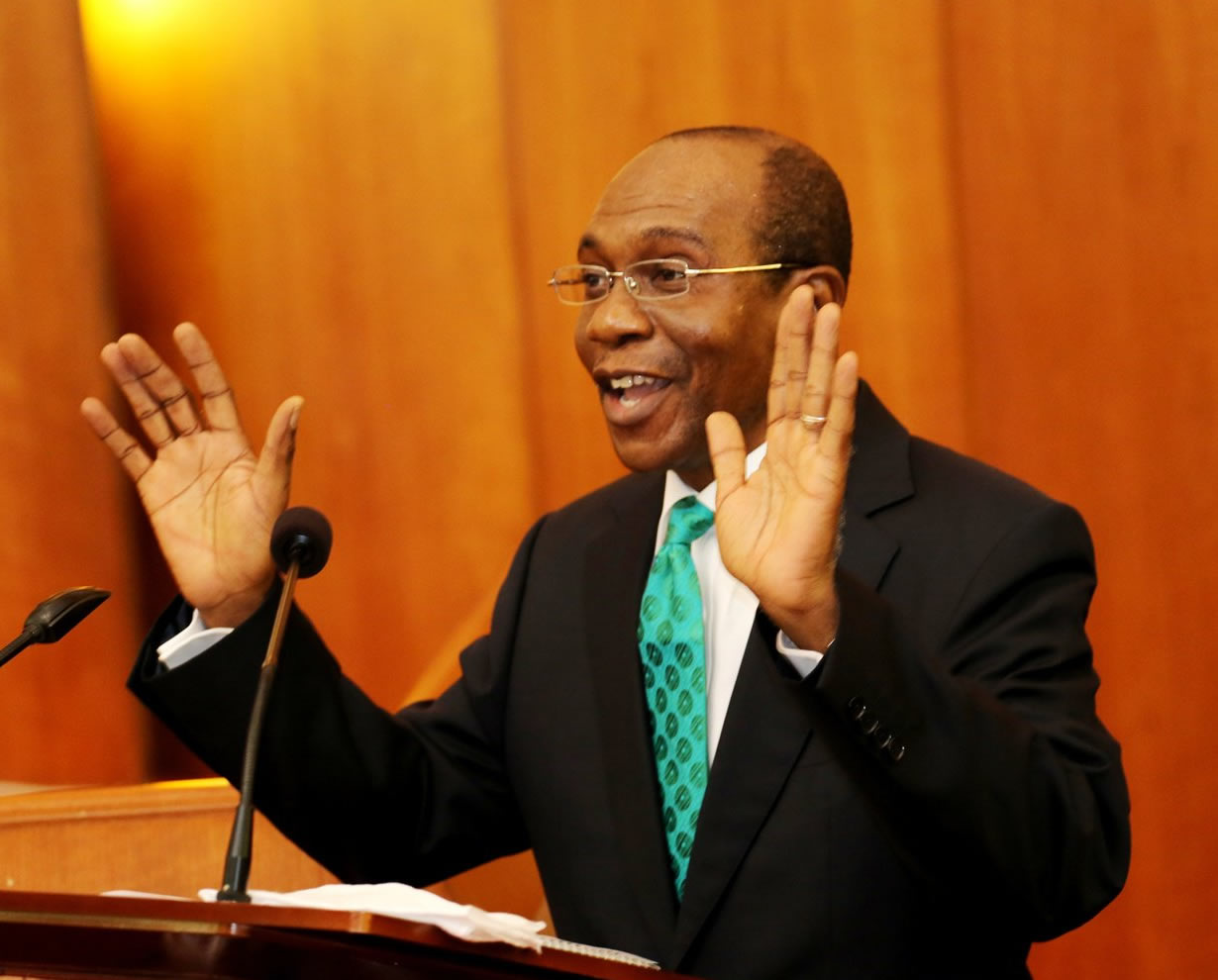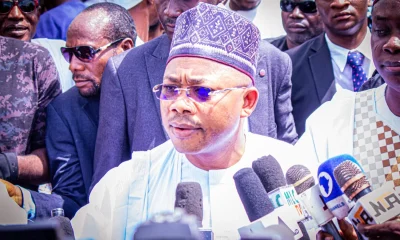BUSINESS
Going Forward with CBN, Emefiele’s 5-Year Roadmap

By Tony Obiechina, Abuja
The Governor of the Central Bank of Nigeria (CBN) Mr Godwin Emefiele, on Monday 24th July, 2019 unfolded the policy direction of his new five-year tenure which will terminate in 2024.
Addressing a World Press Conference at the CBN corporate headquarters in Abuja, the governor promised to facilitate access to financial services to 95 per cent eligible Nigerians as well as “continue to work to safeguard the stability of our financial system, while supporting the development of a payment system infrastructure that will improve access to credit for all eligible Nigerians”.
“Over the next five years, this will be the task for the Central Bank of Nigeria under my leadership, and we intend to do our very best to achieve these objectives”, he had assured.
Although Emefiele acknowledged that much was still left to be achieved from a similar agenda set in July 5, 2014, when he was first appointed, he said he was confident the bank will meet the expectations of Nigerians in the next five years.
Reviewing the achievements and challenges of the CBN in his first tenure, the governor pointed out that “with increased consultation and cooperation with the fiscal authorities and other interest groups, the agenda will be realised”.
In driving this vision, Emefiele expects that the bank under his management for the next five years, will work closely with the fiscal authorities to target a double digit growth; bring down inflation to single digit; and accelerate the rate of employment”.
“Put succinctly, our priorities at the CBN over the next five years are the following; First, preserve domestic macroeconomic and financial stability; Second, foster the development of a robust payments system infrastructure that will increase access to finance for all Nigerians thereby raising the financial inclusion rate in the country; Third, continue to work with the
Deposit Money Banks to improve access to credit for not only small holder farmers and MSMEs but also consumer credit and mortgage facilities for bank customers. Our intervention support shall also be extended to our youth population who possess entrepreneurship skills in the creative industry,” he had said.
Even as the governor promised to encourage the Deposit Money Banks to direct more focus in supporting the education sector, grow the country’s external reserves, and support efforts at diversifying the economy through CBN intervention programmes in the agriculture and manufacturing sectors, the apex bank may have concluded plans to raise the banks’ minimum capital base from the present N25 billion to over N200 billion.
“In the next five years, we intend to pursue a programme of recapitalising the banking Industry to position Nigerian banks among the top 500 in the world.
“Banks will therefore be required to maintain higher levels of capital, as well as liquid assets in order to reduce the impact of an economic crisis on the financial system,” he said.
On macro-economic stability, he said over the next five years, emphasis would be on supporting improved gross domestics product (GDP) growth and greater private sector investment.
According to him, the CBN intends to leverage monetary policy tools in supporting a low inflation environment, while seeking to maintain stability in our exchange rate.
He said decisions by the Monetary Policy Committee on inflation and interest rates will be dependent on insights generated from data on key economic variables.
He also said the CBN would also strive to continue to sustain a positive interest rate regime and that monetary policy measures, will be geared towards containing inflationary pressure and supporting improved productivity in the agricultural and manufacturing sectors.
To bring down the cost of food items, which have considerable weight in the Consumer Price Index basket, Mr Emefiele said the bank will work with other interest groups towards that objective.
“Our ultimate objective is to anchor the public’s inflation expectation at single digits in the medium to long run. We believe a low and stable inflationary environment is essential to the growth of our economy because it will help support long term planning by individuals and businesses,” he assured.
On Exchange Rate Stability, Mr Emefiele said the bank will continue to operate a managed float exchange rate regime, to reduce the impact the continuous volatility in the exchange rate could have on the country’s economy.
He the CBN will support measures to increase and diversify Nigeria’s exports base and ultimately help in shoring up the country’s foreign reserves.
Nigeria, he said, remains committed to a free trade regime that is mutually beneficial; but, particularly aimed at supporting our domestic industries and creating jobs on a mass scale for Nigerians.
Consequently, he said, the CBN intends to aggressively implement its N500 billion financial support facility to boost the growth of the non-oil exports and improve non-oil export earnings.
To achieve Financial System Stability, Mr Emefiele said a resilient and stable financial system was imperative for continued growth of the country’s economy given the intermediation role of financial institutions, to support the needs of individuals and businesses.
“In the next five years, we intend to pursue a programme of recapitalising the banking Industry to position Nigerian banks among the top 500 in the world.
“Banks will therefore be required to maintain higher levels of capital, as well as liquid assets in order to reduce the impact of an economic crisis on the financial system,” he said.
Reacting to the development. the Chairman, Charteted Institute of Bankers (CIBN), Abuja Chapter, Prof Uche Uwsleke said Ememefie’s five year policy thrust “is a good development with a lot of positive impact on the economy”.
In an interview with Daily Asset on Tuesday, Uwaleke, professor of Capital Market said, “The recapitalization of banks will strengthen financial system stability and put our banks in a stronger position to finance big projects needed for development as well as play in the global scene”.
“The planned introduction of a Trade monitoring system that reduces the length of time it takes to process export documents from one week to one day will surely boost exports.
“Also commendable is the plan to scale up the Anchor Borrower Programme and target for massive funding support 10 commodities that consume a lot of foreign exchange to import.
“This will help conserve Forex, grow external reserves, reduce food prices and possibly create job opportunities. The plan to build a robust payment infrastructure including through promoting payment service banks, shared agent networks, mobile money will go a long way in helping to achieve the target of 95 percent financial inclusion by the year 2024.
“Similarly, the boost in the Collateral Registry where over N400 billion worth of assets have been registered as well as the NISRAL microfinance bank will no doubt improve access to finance by micro and small businesses.
“The major risk I see in the pursuit of price and monetary stability which is the core function of the CBN is the volatility in crude oil price given our dependence on the sector. The CBN is therefore advised to have a plan B in its five year plan.
“It is also vital to get the cooperation of the fiscal authorities especially when it comes to the task of achieving double digit growth because on this very score, the CBN cannot clap with one hand”, he argued.
On capitalization, the university don’t however advised the CBN to raise the banks’ capital base to N100 billion, up from N25 billion.
“The N25 billion is already eroded when you look at our exchange rate. It is better to have 10 healthy banks than 20 that will be giving CBN headache. The tier two banks are also the most exposed banks to NPLs. The big five, are not giving CBN much problem like the others”, he argued.
“Bigger banks can easily bankroll larger businesses. So, if we are one of the 500 banks in the world, we can play comfortably in the international league. Bigger banks have better corporate governance and monitoring by CBN is much easier. Fewer stronger banks will invest in the right technology to deliver better services”, Uwaleke further pointed out.
In his reaction, CIBN President, Dr Uche Olowu, said there was no need for panic among bankers as the Nigeria financial system remains stable stressing that the whole idea of recapitalisation was to continue to sustain that stability in order to expand the scope of banks to do bigger businesses.
Olowu however advised the boards of the banks to go back to the drawing board and restrategise ahead of the CBN’s impending reapitalisation, assuring that the system will take care of itself with adequate planning.
BUSINESS
IMF Predicts 0.5% GDP Revenue Loss for Nigeria

Torough David, Abuja
The Federal Government may lose as much as 0.5 percent of the country’s Gross Domestic Product in revenue following its decision not to raise the Value Added Tax rate, the International Monetary Fund has disclosed.
In its latest Article IV Consultation Report on Nigeria, the IMF stated that although the recent tax reforms approved by the National Assembly and President Bola Tinubu represent a major step forward in modernising the VAT and Company Income Tax regimes, the choice to maintain the current VAT rate would lead to an immediate revenue shortfall.
“The decision not to raise the VAT rate now is reasonable, given high poverty and food insecurity, and with the cash transfer system to support the most vulnerable households not yet fully rolled out.
However, this will reduce consolidated government revenue by up to ½ per cent of GDP in the authorities’ estimates,” the report noted.While the Federal Government is expected to be largely insulated from the fallout—thanks to expected gains from improved CIT compliance—the blow will be felt most by state and local governments.
According to the Fund, unless alternative financing options are found, subnational governments may be forced to either scale back spending or ramp up their own revenue efforts.
The IMF, however, acknowledged the government’s justification for delaying a VAT hike, particularly at a time of worsening poverty and food insecurity.
With only 5.5 million of the targeted 15 million households reached under the federal cash transfer programme, the Fund noted that raising VAT at this stage could further strain vulnerable households.
Nonetheless, it cautioned that the cost of delaying reform would fall on already stretched public finances, especially at the subnational level.
“Assuming no alternative financing sources, they [states and LGAs] would have to raise additional revenue or reduce spending, which is assumed in the baseline,” the report said.
Despite this challenge, the IMF welcomed the tax reform agenda being driven by the Presidential Committee on Fiscal Policy and Tax Reforms, describing it as critical to reversing Nigeria’s poor revenue-to-GDP ratio, one of the lowest globally.
The reforms aim to boost compliance and enforcement, and the Fund believes they hold “significant medium-term revenue potential” once fully implemented.
Measures include modernising the VAT and CIT frameworks, tightening exemptions, and introducing digital tools to monitor compliance. Total revenue and grants reached 14.4 per cent of GDP in 2024, up from 9.8 per cent in 2023, buoyed by currency depreciation and improved administration.
However, public debt also rose, hitting 52.9 percent of GDP last year, with interest payments consuming 41.1 percent of Federal Government revenue. The IMF advised the government to maintain a neutral fiscal stance in 2025, stressing that revenue shortfalls should not lead to excessive borrowing.
It also urged the authorities to clearly set out a medium-term revenue plan, including timelines for further tax policy changes, to restore investor confidence and ensure policy credibility.
The report stated, “Pre-committing to an implementation timeline for further policy measures in an updated medium-term framework would support fiscal sustainability and provide guidance on available fiscal space for development spending and support for the most vulnerable households.”
Nigeria’s decision not to raise VAT comes at a time of heightened global and domestic uncertainty. Lower oil prices, rising financing costs, and mounting social pressures have narrowed the government’s fiscal space.
The IMF observed that while reforms since 2023—including fuel subsidy removal and the liberalisation of the foreign exchange market—have improved macroeconomic stability, their benefits have yet to trickle down to most Nigerians.
With inflation still elevated at 22.9 per cent as of May 2025, and poverty levels worsening, the government appears to be prioritising stability over revenue acceleration, for now.
However, the IMF warned that the long-term cost of inaction could be higher if reforms stall or if subnational governments struggle to adjust.
In the meantime, the IMF continues to support Nigeria’s reform efforts, including through capacity development and the deployment of a resident advisor to assist with revenue mobilisation strategies.
The Nigeria Economic Summit Group warned that the Federal Government could face revenue shortfalls if it does not increase the value-added tax rate as part of the ongoing tax reform process.
The Chief Executive Officer of NESG, Dr. Tayo Aduloju, made this statement during an interactive media session in Abuja. He emphasised that while reforms in the VAT system are essential, maintaining the current VAT rate without an increase could lead to a significant loss of revenue for the government.
Speaking on the issue, Aduloju said, “Without those rate hikes, it means that the government might lose some revenue.” Aduloju explained that the current tax reform process must strike a balance between simplifying the tax system and increasing the VAT rate to maintain revenue stability.
According to him, simply reducing the number of taxes without adjusting the VAT rate could weaken the government’s revenue base.
| ReplyReply allForwardAdd reaction |
BUSINESS
Dangote Submits Paper Work for Largest Seaport, Plans Gas Export

Torough David, Abuja
The President/Chief Executive of Dangote Group, Aliko Dangote, has commenced the process to develop what he described as Nigeria’s biggest and deepest seaport in Olokola, Ogun State, a move that signals the expansion of his multibillion-dollar industrial empire and a strategic push into maritime logistics.
Speaking during an interview in Lagos on Monday, Dangote disclosed that he submitted the necessary paperwork for the seaport project in late June.
The planned port, located about 100 kilometres from his Lekki-based refinery and fertilizer complex in Lagos, is expected to ease the export of goods such as fertilizer, petrochemicals, and liquefied natural gas, while enhancing access for imported equipment and raw materials.
“It’s not that we want to do everything by ourselves, but I think doing this will encourage other entrepreneurs to come into it,” Dangote said, expressing optimism that the project would attract more private investment into Nigeria’s underdeveloped port infrastructure.
Dangote currently exports urea and fertilizer through an on-site jetty he built, that also receives heavy equipment for the refinery.
The proposed Atlantic seaport, if approved, will rival existing ports in Lagos, including the recently completed Lekki Deep Sea Port, which was funded by Chinese investors and began operations in 2023.
It also marks a return to the Olokola site for Dangote, who had previously shelved plans to site his massive refinery and fertilizer plant there due to conflicts with local authorities.
Those disputes, however, appear to have been resolved under the current administration.
The development also comes four months after he disclosed readiness of the company to return to the Olokola Free Trade Zone in Ogun Waterside Local Government Area of the state.
Dangote also plans to export liquefied gas from Lagos, a project that will involve constructing pipelines from Nigeria’s oil-rich Niger Delta., vice-president of the group Devakumar Edwin said in another interview.
“We want to do a major project to bring more gas than what NLNG is doing today,” he said, referring to Nigeria LNG Ltd., a joint-venture between the government, Shell Plc, Eni SpA and TotalEnergies SE, which is currently the continent’s largest exporter of LNG.
“We know where there is a lot of gas, so run a pipeline all through and then bring it to the shore.”
Dangote already sources natural gas from the Niger Delta to supply his fertilizer plant, where it’s used as feedstock to produce hydrogen for ammonia, a key component in the production of the crop nutrient.
The billionaire also plans to start distributing fuel to retailers in Nigeria from August, using a fleet of 4,000 gas-powered trucks, a move that has drawn criticism from some groups accusing him of attempting to monopolise the oil sector, which he has denied.
Dangote, valued at $27.8bn according to the Bloomberg Billionaires Index, also owns cement manufacturing and sugar plants in Africa.
Oil & Gas
Lawyers Integral to Optimal Regulatory Compliance in Oil Business – NMDPRA

The Midstream and Downstream Petroleum Regulatory Authority (NMDPRA) said the role of legal practitioners is critical across the midstream and downstream energy business value chain in the promotion of optimal regulatory compliance.
Chief Executive, NMDPRA, Farouk Ahmed said this on Monday in Abuja at its 2025 General Counsel and Legal Advisers Forum for Midstream and Downstream Petroleum Companies in Nigeria.
The forum has its theme as ‘Advancing a Collaborative Compliance Culture in Nigeria’s Midstream and Downstream Petroleum Sectors’.
Ahmed was represented by Ogbugo Ukoha, Executive Director, Distribution System, Storage and Retailing Infrastructure, NMDPRA.
He said that the sector’s complexity required a unified compliance culture, rooted in robust and enabling legal frameworks, transparency, accountability and shared responsibility.
“The scope of operations of the sector covers hydrocarbon processing, wholesale marketing, transportation, storage, distribution and retail, and its complexity requires more than technical efficiency.
“The role of legal practitioners is critical across the midstream and downstream energy business value chain.
“They help to promote optimal regulatory compliance to set rules and standards of operations in our complex operational and volatile market environment,’’ he said.
Ahmed said that strategic and pragmatic solutions would be established from the forum to enhance performance of the sector towards creation of shared value for investors and the extensive market of Nigeria and the region.
He said that the Petroleum Industry Act (PIA 2021) had fundamentally restructured Nigeria’s petroleum industry by delineating regulatory responsibilities of the industry into the Upstream, midstream and downstream Petroleum operations.
According to him, the Act prescribed that all operations in the midstream and downstream sectors could only be conducted under appropriate licenses, permits and authorisations granted by the NMDPRA.
He said the PIA also mandated NMPDRA to make regulations concerning midstream and downstream petroleum operations in consultation with its licensees and stakeholders.
“As a result of the feedback received from our stakeholders on the need to strengthen regulatory compliance through simplified regulations, NMDPRA is implementing an inclusive stakeholder process of streamlining the gazetted and published regulations.
“This process will mitigate the complexities of navigating and implementing numerous regulations; eliminate inconsistencies and repetitions across multiple regulations; streamline regulatory processes for ease of business; and encourage investments in the industry.
“Kindly use this forum to critically review and make recommendations on the above.
This will enable us to improve the overall compliance of operators and the performance of the regulatory instruments (Legal frameworks and licenses) in the midstream and downstream sectors,” He said.
He said that NMDPRA would continue its commitment to effective stakeholder collaborations that would foster ease of doing business, investor confidence and sustainable operations.
Deputy Speaker, House of Representatives, Benjamin Kalu said that the PIA as a testament to the foresight and dedication of the National Assembly, had fundamentally reshaped Nigeria’s petroleum sector.
Kalu was represented by Ugochinyere Ikenga, Chairman, House Committee on Petroleum Resources, Downstream.
He said that the act had proven how strategic legislation could serve as a potent catalyst for compliance, investment attraction, and robust sector growth.
“For the PIA to remain truly effective, adapting to a dynamic global energy landscape and addressing unforeseen challenges, there must be an institutionalised robust mechanism for its continuous refinement.
“This is precisely where the invaluable insights of our nation’s petroleum experts and our general counsels, the legal architects and navigators of this complex framework, become indispensable.
“For or further synchronisation and effective post-legislative scrutiny, we must actively solicit and integrate your concerns.
“We envision a future where the National Assembly’s specialised committees regularly invite you professionals to public hearings and dedicated technical working groups,” he said.
Kalu said that this proactive engagement would transform abstract legal principles into tangible operational realities, furnishing us with the real-world data and case studies needed to truly understand the PIA’s strengths and weaknesses.
“Your feedback will illuminate where the PIA might be technically challenging, where legal interpretations create bottlenecks, or where new global trends necessitate legislative evolution,’’ he said.



























